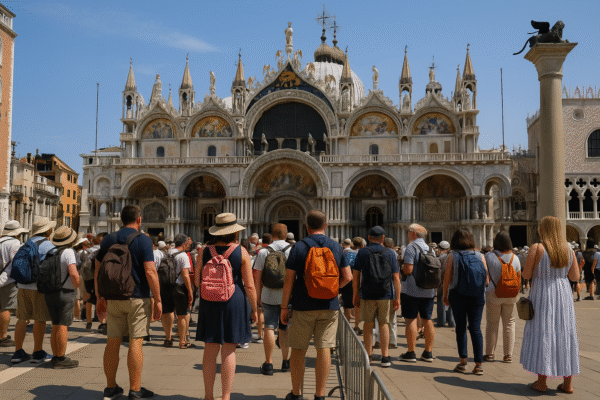As overtourism, environmental degradation, and infrastructure strain reach critical levels, Europe is taking decisive action in 2025. Major destinations including Spain, Greece, Italy, Norway, Switzerland, and the United Kingdom have introduced new tourism tax models designed to strike a balance between economic benefit and sustainability. These policies are reshaping how international travelers explore Europe, marking a new chapter in responsible tourism.
Spain: From Barcelona’s Hotel Tax to Tenerife’s Eco-Charge
Barcelona, a magnet for global tourism, raised its hotel tax significantly in 2025. Visitors now pay €6.75 per night at five-star hotels, adding up to over €47 for a week-long stay. This hike directly addresses the cost of maintaining infrastructure overwhelmed by more than 32 million annual visitors, according to the Ajuntament de Barcelona. The revenue will fund public transport upgrades, heritage preservation, and community-led tourism initiatives.
In the Canary Islands, Tenerife’s Mount Teide—a UNESCO-listed National Park—will implement an eco-tax in 2026. Though still in planning, this fee will apply to summit hikers and park entrants, with proceeds supporting waste control, trail maintenance, and wildlife conservation. Spain’s new approach prioritizes nature protection amid skyrocketing visitor numbers.
Italy: Venice Implements Day-Trip Tax
Venice, a city battling decades of overtourism, rolled out its long-debated €5 day-trip tax in 2025. Targeted at short-stay tourists—who often crowd canals and piazzas without supporting local businesses—this levy is a cornerstone of the city’s sustainable tourism plan. The Comune di Venezia states that this initiative will help fund waste services, maintenance of fragile waterways, and crowd-control systems.
The tax applies only on peak days, mostly weekends and public holidays, and visitors must book entry in advance. Venice hopes this fee will discourage unsustainable mass tourism and instead foster longer, more immersive visits that benefit local communities.
Greece: Managing Island Overload with Cruise Taxes
On Greek islands like Santorini and Mykonos, where cruise ships unload thousands of passengers per day, the government now imposes a €20 per person tax on cruise visitors. According to the Hellenic Ministry of Tourism, this move targets high-impact tourism while funding island sustainability projects, such as wastewater management and dock renovations.
In addition, Greek authorities plan to roll out overnight stay levies and seasonal surcharges on highly visited archaeological sites. The goal is clear: reduce environmental stress and ensure island communities retain their character and liveability.
Norway: Fjord Tourism Fee Introduced
Famed for its pristine fjords and arctic adventures, Norway introduced targeted visitor fees in 2025. Travelers heading to iconic destinations like Geirangerfjord and Nærøyfjord must now pay small entrance charges. The Norwegian Environment Agency emphasizes that these fees fund trail preservation, glacier protection, and visitor education programs.
Norway’s government warns that without regulating access to fragile natural areas, the country risks losing its ecological treasures to uncontrolled tourism. The model not only supports conservation but also limits seasonal crowding in remote mountain and coastal villages.
Switzerland: Regulating the Short-Term Rental Market
Switzerland’s new Value Added Tax (VAT) policy, effective in 2025, mandates that short-term rentals via platforms like Airbnb collect a 7.7% VAT. This aligns the short-term rental sector with traditional hotels and ensures fair competition. The Swiss Federal Tax Administration expects this will generate millions in public revenue annually.
Funds are earmarked for municipal services, road maintenance, and local tourism board initiatives. It also gives local authorities a clearer picture of tourist numbers, aiding planning in places like Zermatt and Lucerne, where accommodation shortages and housing inflation have become pressing issues.
United Kingdom: Wales Pioneers Tourist Tax by 2027
While England and Scotland have yet to adopt formal tourism levies, Wales will introduce a tourist tax in 2027, according to the Welsh Government. The proposed levy will apply to overnight stays in hotels, guesthouses, and holiday parks. Officials emphasize the tax’s role in supporting rural infrastructure and reducing seasonal stress on towns like Tenby, Conwy, and Snowdonia.
Wales is also encouraging “dispersed tourism”, pushing travelers to explore less-frequented areas like the Cambrian Mountains. This strategic redirection aims to ensure tourism strengthens local economies without overburdening a few hotspots.
Why These Tourism Taxes Matter
With Europe welcoming over 700 million international tourists annually, the new wave of tourism taxes aims to:
- Offset infrastructure strain
- Protect cultural and natural heritage
- Fund environmental conservation
- Promote longer, higher-value stays
The European Travel Commission notes that such taxes could contribute significantly to sustainable tourism if transparently managed. Importantly, these taxes are not intended to discourage travel, but to encourage responsible tourism behavior.
Final Thoughts: A New Travel Norm in Europe
For travelers, these new fees might mean slightly higher budgets, but they also pave the way for cleaner, safer, and more authentic experiences. For host countries, tourism taxes signal a commitment to balance economic gain with ecological and cultural stewardship.
As more destinations globally watch Europe’s evolving tax frameworks, 2025 may well be remembered as a turning point—where mass tourism began its transition toward a more conscious, community-focused future.
For more travel news like this, keep reading Global Travel Wire



















